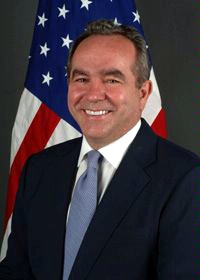Research
Special Projects
Biden Administration International Affairs Personnel Tracker
Dr. Kurt Campbell

Deputy Assistant to the President and Coordinator for Indo-Pacific Affairs
Dr. Kurt Campbell has been a key player in shaping American foreign policy in Asia since the early 2000s through his roles in American think tanks, private industry, and as a government official. Following his role as senior vice president, director of the International Security Program, and the Henry A. Kissinger Chair in National Security Policy at the Center for Strategic and International Studies, Dr. Campbell also served as the chief executive officer and co-founder of the Center for a New American Security. In the private sector, he led strategic advisory firms such as StratAsia and most recently served as the chairman and CEO of The Asia Group, LLC, which he founded in 2013.
Most prominently, he was confirmed as Assistant Secretary of State for East Asian and Pacific Affairs in 2009, a position he held until early 2013. Together with Hillary Clinton, he was a primary architect of the Obama administration’s Pivot to Asia Strategy (later renamed Rebalance to Asia and the Pacific). On January 13, 2020 The Asia Group announced that Dr. Campbell would join the Biden-Harris Administration as the Deputy Assistant to the President and Coordinator for Indo-Pacific Affairs on the National Security Council, in which he would work directly under national security advisor Jake Sullivan. According to a Washington Post report, there will be a number of these “Coordinator” roles, which will be granted greater authority than the “Senior Director” roles, which will be directly beneath them. Dr. Campbell is considered to be a China hawk and has endorsed many of the Trump administration’s tougher approaches towards China. However, he has criticized the administration for failing to fully engage with the region and for damaging the United States’ relationships with important allies in the region, such as South Korea and Japan.
On China
One day before it was announced he would be joining the Biden administration, Dr. Campbell published an essay with Rush Doshi on Foreign Affairs titled How America Can Shore Up Asian Order. This essay provides a window into how Dr. Campbell is likely to help shape Biden’s Asia foreign policy, particularly with China. In it, they argue that at the heart of the current Indo-Pacific order are the principles of “freedom of navigation, sovereign equality, transparency, peaceful dispute resolution, the sanctity of contracts, cross-border trade, and cooperation on transnational challenges”, and that the United States’ forward-deployed military has helped maintain this balance.
However, they also argue that two intertwined challenges threaten the balance in the region: China’s increased assertiveness through its economic and military rise combined with a U.S. ambivalence through President Trump’s undermining of bilateral relations with allies and his general absence from multilateral processes and economic negotiations. To deter China’s increasingly aggressive pursuit of territorial and economic interests, Dr. Campbell believes it necessary for the US to move away from seeking absolute primacy in the region, but rather invest in the relatively inexpensive and asymmetric capabilities of itself and regional actors across Southeast Asia and the Indian Ocean.
Once in office, Dr. Campbell has presided over a shift in the U.S.-China relationship from one of ‘engagement’ to ‘competition.’ At the same time, U.S. interests have shifted eastwards towards Dr. Campbell’s area of expertise. He ascribes blame for this shift to the “harsh, or hard power” policies of China such as ‘wolf warrior’ international diplomacy, militarization of islands in the South China Sea, and economic aggression against Australia. Campbell has remained ambivalent, however, on any substantive shifts in U.S. regional policy; for instance, amid calls to explicitly commit to defending Taiwan from Chinese aggression, he argued that “There are some significant downsides to…strategic clarity” and supported the ambiguous status quo. For Dr. Campbell, the time is not right to stir the pot beyond a redefinition of the relationship in general, but he welcomes the shift of “[U.S.] strategic focus, economic interests, [and] military might more to the Indo-Pacific.”
Notable Speeches, Testimony & Commentary
- Kurt Campbell: U.S. and China Can Co-Exist Peacefully
- How America Can Shore Up Asian Order: A Strategy for Restoring Balance and Legitimacy
- The Pivot: The Future of American Statecraft in Asia
- The Coronavirus Could Reshape Global Order: China Is Maneuvering for International Leadership as the United States Falters
- Press Release: Dr. Kurt M. Campbell to Join the Biden-Harris Administration
- China Is Done Biding Its Time: The End of Beijing’s Foreign Policy Restraint?
- Competition Without Catastrophe: How America Can Both Challenge and Coexist With China
Media Commentary & Public Perceptions
- Beijing wanted to ‘break’ Australia -U.S. Indo-Pacific adviser
- In warning to China, US official says action against Taiwan will be ‘catastrophic’
- Biden’s Asia Czar Says China Is to Blame for Its Diplomatic Woes
- Biden’s Asia Czar Says Era of Engagement with China is Over
- US-China ties: competition, not engagement from now on, Kurt Campbell says
- Hotlines ‘ring out’: China’s military crisis strategy needs rethink, says Biden Asia chief
- Washington shies away from open declaration to defend Taiwan
- The Troubling Business Connections of Biden’s Asia Advisor Kurt Campbell
- Biden’s pick for top Asia official should reassure nervous allies
- Joe Biden poised to name foreign policy expert as Asia tsar
- Obama-era veteran Kurt Campbell to lead Biden’s Asia policy
Page Last Updated: December 2, 2021
*None of the personnel in this tracker are associated with the Institute for China-America Studies. All images used on this page are sourced from the official Biden-Harris transition website buildbackbetter.gov or the public domain.*

